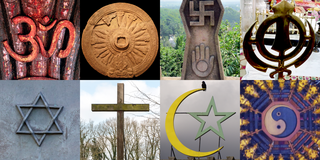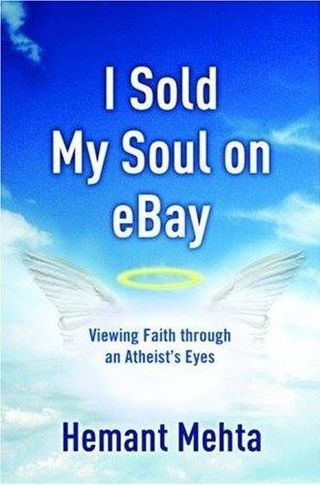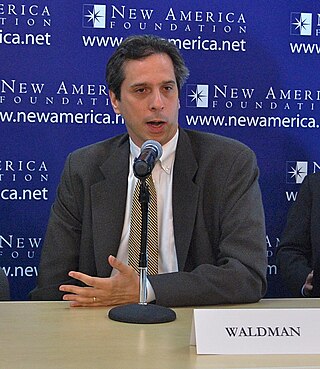Irreligion is the absence or rejection of religious beliefs or practices. It encompasses a wide range of viewpoints drawn from various philosophical and intellectual perspectives, including atheism, agnosticism, skepticism, rationalism, secularism, and spiritual but not religious. These perspectives can vary, with individuals who identify as irreligious holding diverse beliefs about religion and its role in their lives.

Tikkun was a quarterly progressive Jewish and interfaith magazine and website published in the United States that analyzed American and Israeli culture, politics, religion, and history in the English language. The magazine consistently published the work of Israeli and Palestinian left-wing intellectuals, but also included book and music reviews, personal essays, and poetry.

James E. Wallis Jr. is an American theologian, writer, teacher and political activist. He is best known as the founder and editor of Sojourners magazine and as the founder of the Washington, D.C.–based Christian community of the same name. In 2021, Wallis joined Georgetown University as the inaugural Archbishop Desmond Tutu Chair in Faith and Justice. He also leads the Center on Faith and Justice at Georgetown. Wallis is known for his advocacy on issues of peace and social justice. Although Wallis actively eschews political labels, he describes himself as an evangelical and is often associated with the evangelical left and the wider Christian left. He worked as a spiritual advisor to President Barack Obama. He is also a leader in the Red-Letter Christian movement.

A religious symbol is an iconic representation intended to represent a specific religion, or a specific concept within a given religion.
Religions are represented on the Internet in many ways. There are sites which attempt to cover all religions, traditions, and faiths, such as Patheos, Religious Tolerance, and Beliefnet. There are also sites that are specific to a religious tradition. Many sites are discussion groups, others host theological debates, and some provide advice concerning religious doctrine. Some sites aim to provide a religious experience facilitating prayer, meditation, or virtual pilgrimages. People also leverage search engines to investigate aspects of religion. Some religious websites are translated into several languages. For example, JW.ORG features content in over 1,000 languages.

Samuel Benjamin Harris is an American philosopher, neuroscientist, author, and podcast host. His work touches on a range of topics, including rationality, religion, ethics, free will, neuroscience, meditation, psychedelics, philosophy of mind, politics, terrorism, and artificial intelligence. Harris came to prominence for his criticism of religion, and is known as one of the "Four Horsemen" of New Atheism, along with Richard Dawkins, Christopher Hitchens, and Daniel Dennett.

Cathleen Falsani is an American journalist and author. She specializes in the intersection of religion/spirituality/faith and culture, and has been a staff writer for the Chicago Sun Times, the Chicago Tribune, Sojourners magazine, Religion News Service, and the Orange County Register in Southern California. Falsani is the author of several non-fiction books on religious, spiritual, and cultural issues.
Beliefnet is a pseudo-Christian lifestyle website featuring editorial content related to the topics of inspiration, spirituality, health, wellness, love and family, news, and entertainment.

I Sold My Soul on eBay: Viewing Faith Through an Atheist's Eyes is a non-fiction book by Hemant Mehta, an atheist and blogger, and podcaster, who describes his visits to a variety of Christian churches. These visits initially occurred as a result of an eBay auction Mehta created where he offered to visit the worship services of the winning bidder's choosing. The media later branded this auction as Mehta "selling his soul."
Brad Hirschfield is a rabbi, author, and president of the National Jewish Center for Learning and Leadership (CLAL). Hirschfield was ranked three years in a row in Newsweek as one of America's "50 Most Influential Rabbis" and recognized as a leading “Preacher & Teacher” by Beliefnet.com.
ScienceBlogs is an invitation-only blog network and virtual community that operated initially for almost 12 years, from 2006 to 2017. It was created by Seed Media Group to enhance public understanding of science. Each blog had its own theme, speciality and author(s) and was not subject to editorial control. Authors included active scientists working in industry, universities and medical schools as well as college professors, physicians, professional writers, graduate students, and post-docs. On 24 January 2015, 19 of the blogs had seen posting in the past month. 11 of these had been on ScienceBlogs since 2006. ScienceBlogs shut down at the end of October 2017. In late August 2018, the website's front page displayed a notice suggesting it was about to become active once again.

Diana Butler Bass is an American historian of Christianity and an advocate for progressive Christianity. She is the author of eleven books.
In the United States, between 4% and 15% of citizens demonstrated nonreligious attitudes and naturalistic worldviews, namely atheists or agnostics. The number of self-identified atheists and agnostics was around 4% each, while many persons formally affiliated with a religion are likewise non-believing.

Steven Waldman is an American journalist. He is president and co-founder of Report for America—a national service program that deploys emerging journalists to local newsrooms. He is also the founder and president of Rebuild Local News, a nonpartisan nonprofit advocacy group dedicated to addressing the decline of local news and enhancing local democracy.
Jana Kathryn Riess is an American professor, writer, and editor. Riess' writings have focused on American religions, especially the Church of Jesus Christ of Latter-day Saints of which she is a member, and other new religious movements.

Dale McGowan is an American author, educator, podcaster, and philanthropist who has written and edited several books related to nonreligious life, particularly parenting without religion.
The secular movement refers to a social and political trend in the United States, beginning in the early years of the 20th century, with the founding of the American Association for the Advancement of Atheism in 1925 and the American Humanist Association in 1941, in which atheists, agnostics, secular humanists, freethinkers, and other nonreligious and nontheistic Americans have grown in both numbers and visibility. There has been a sharp increase in the number of Americans who identify as religiously unaffiliated, from under 10 percent in the 1990s to 20 percent in 2013. The trend is especially pronounced among young people, with about one in three Americans younger than 30 identifying as religiously unaffiliated, a figure that has nearly tripled since the 1990s.

Benjamin E. Park is an American historian concentrating on early American political, religious, and intellectual history, history of gender, religious studies, slavery, anti-slavery, and Atlantic history. Park is an assistant professor at Sam Houston State University.

Stephen Richard Palmquist is an American philosopher, currently living in Los Angeles. He taught philosophy at various universities in Hong Kong from 1987 to 2021. A Patheos article referred to him as "one of the greatest living interpreters of Kant".
Roger S. Gottlieb is professor of philosophy and Paris Fletcher Distinguished Professor in the Humanities at Worcester Polytechnic Institute. He has written and edited 21 books, including two Nautilus Book Awards winners, and over 150 papers on philosophy, political theory, environmental ethics, religious studies, religious environmentalism, religious life, contemporary spirituality, the Holocaust, and disability. He is internationally known for his work as a leading analyst and exponent of religious environmentalism, for his passionate and moving account of spirituality in an age of environmental crisis, and for his innovative and humane description of the role of religion in a democratic society.











